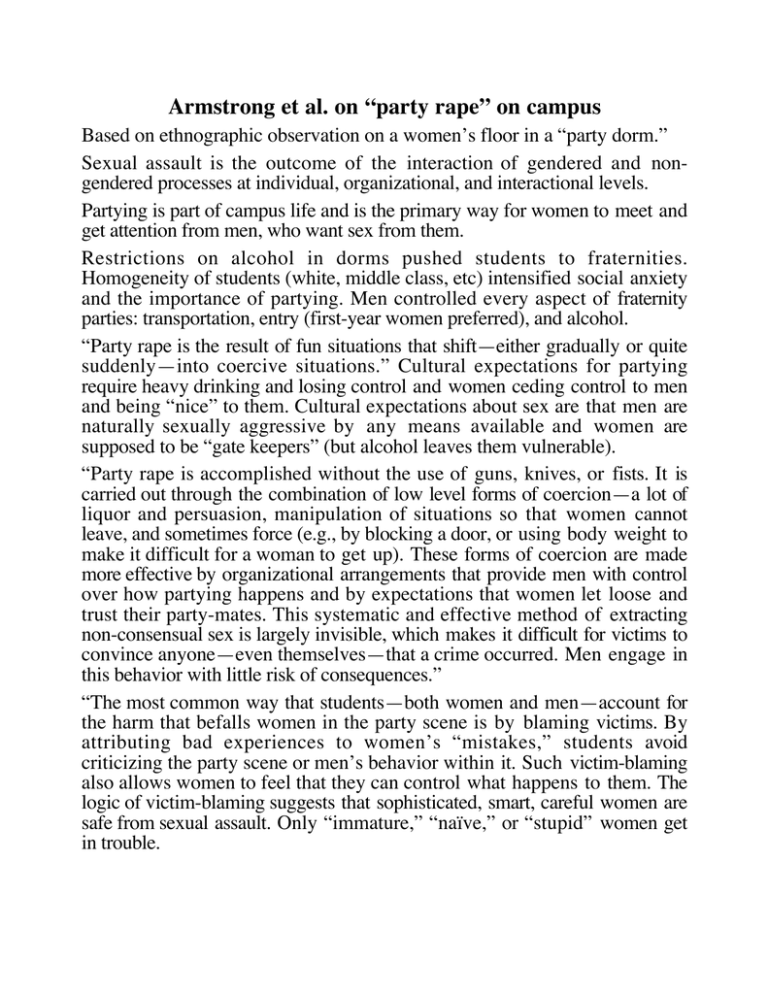
Armstrong et al. on “party rape” on campus
Based on ethnographic observation on a women’s floor in a “party dorm.”
Sexual assault is the outcome of the interaction of gendered and nongendered processes at individual, organizational, and interactional levels.
Partying is part of campus life and is the primary way for women to meet and
get attention from men, who want sex from them.
Restrictions on alcohol in dorms pushed students to fraternities.
Homogeneity of students (white, middle class, etc) intensified social anxiety
and the importance of partying. Men controlled every aspect of fraternity
parties: transportation, entry (first-year women preferred), and alcohol.
“Party rape is the result of fun situations that shift—either gradually or quite
suddenly—into coercive situations.” Cultural expectations for partying
require heavy drinking and losing control and women ceding control to men
and being “nice” to them. Cultural expectations about sex are that men are
naturally sexually aggressive by any means available and women are
supposed to be “gate keepers” (but alcohol leaves them vulnerable).
“Party rape is accomplished without the use of guns, knives, or fists. It is
carried out through the combination of low level forms of coercion—a lot of
liquor and persuasion, manipulation of situations so that women cannot
leave, and sometimes force (e.g., by blocking a door, or using body weight to
make it difficult for a woman to get up). These forms of coercion are made
more effective by organizational arrangements that provide men with control
over how partying happens and by expectations that women let loose and
trust their party-mates. This systematic and effective method of extracting
non-consensual sex is largely invisible, which makes it difficult for victims to
convince anyone—even themselves—that a crime occurred. Men engage in
this behavior with little risk of consequences.”
“The most common way that students—both women and men—account for
the harm that befalls women in the party scene is by blaming victims. By
attributing bad experiences to women’s “mistakes,” students avoid
criticizing the party scene or men’s behavior within it. Such victim-blaming
also allows women to feel that they can control what happens to them. The
logic of victim-blaming suggests that sophisticated, smart, careful women are
safe from sexual assault. Only “immature,” “naïve,” or “stupid” women get
in trouble.
Sean Michael Gilmore on “Sport Sex”
Based on interviews with college-age men and women and open-ended
surveys.
Gilmore describes two differences between how men and women talk about
sex.
1. Sexual promiscuity was viewed as positive for men but not women. “The
‘mythology of the stud’ is constructed through the discourse of ‘scoring’;
that is, men bragging about the number of women they sexually conquered.”
Men were rewarded for having sex with different women in different ways;
monogamy is stigmatized and sometimes punished.
2. Men discussed sex in terms of games and contests. Women framed sex in
terms of the development of a relationship.
“Language defines and constructs what is and is not real. To label an object
is to construct what it is and what it is not. For example, to call an object a
‘chair’ is to position the object as something useful that people can sit on,
but that same object can be labeled a ‘piece of junk,’ defining it as useless,
something to be discarded. Language and labels suggest how actors
understand and value their experiences. This research shows how a group of
young males created a discursive reality in which women were not just sex
objects, but points in sexual contests.”
“As long as there exists positive symbolic reward for males who have sex
with multiple partners, and simultaneously negative symbolic punishment for
young men who demonstrate signs of commitment toward a woman, many
young men will be socialized into competing with each other for studhood.
When competing for studhood, sex becomes a game and women become
points, objectified as something to score. Young men never say, ‘I got some
human being last night. As a matter of fact, I’ve gotten more human being
than you have this year.’ Men must objectify women, strip them of their
dignity and respect, dehumanize them, in order to play these sex games. By
playing these sex games, young men create a reality in which the
objectification and exploitation of women becomes the accepted and
encouraged norm. For too long, young men have been bragging about sex
ganes and competitions behind closed doors. When we expose the true
nature of their sexual discourse and the negative position it creates for
women, then action can be taken to rectify the situation.”












